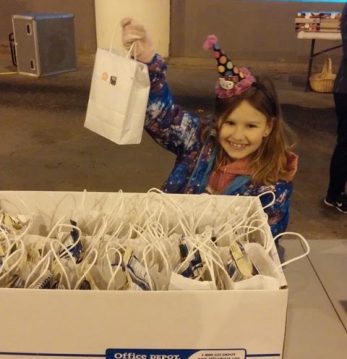My 7-year-old was recently asked to write about why she volunteers to help the homeless. When I presented the question to her, her answer was very simple, “Because it’s fun.”
In an attempt to draw out a more in depth answer, I asked, “But what about when it’s winter, and it’s super cold, and you’re shivering, and we’re miserable? It’s not fun then.”
She answered, “But it’s still fun because it’s helping and that’s always fun.”

I was baffled and had no idea how to respond. Sure it can be fun to help out, but there are very many times when “Fun,” is not the word I would use to describe volunteering. It’s rewarding. It’s helpful. It’s necessary, but it’s certainly not always fun.
This week, we read the Torah portion Ki Tavo (Deuteronomy 26). The beginning of the parsha describes a tithing ritual where the farmer is commanded, every third year, to set aside a portion of the field to give to “the Levite, the stranger, the fatherless, and the widow, that they may eat their fill in your settlements” (Deut 26:12).
During Rabbi Malino’s d’var (Torah discussion), someone pointed out that, in the line just prior, we are not only commanded to perform the ritual, but to enjoy it.
“And you shall enjoy, together with the Levite and the stranger in your midst, all the bounty that the L-rd your G-d has bestowed upon you and your household” (Deut 26:11).
The Torah commentary in Etz Chaim notes about that line, “Gratitude and generosity do not seem to come naturally to most people. Most of us must be taught to remember to thank G-d for our good fortune and must learn through experience and satisfaction of sharing our bounty with others” (p 1141-1142).
At that point, I turned to my 7-year-old, pointed to the line and whispered, “That’s you.”
She looked up at me confused, so I explained, “We were commanded to leave a portion of our fields so the hungry could eat.”
“We learned that in Sunday school. I know that,” she chided me (She’s 7. She knows everything).
So I continued, “But this says we’re not just supposed to feed the hungry. We’re supposed to enjoy it. You said you think feeding the hungry is fun. You enjoy it. So you fulfilled the mitzvah.”
She looked thoughtful for a minute then nodded in agreement.
The commentary in Etz Chaim suggests we have to be taught to be generous and to be grateful. I’ve seen too many generous children to believe that. My daughter is not unique. There are many children out there helping their parents, their friends, their communities, their world. They don’t need to be taught. They know this instinctively. Maybe what they need is to be allowed to cling to that kindness. Maybe if we surround our children with people to encourage that and safe spaces to explore that, we can raise adults who actively and joyfully work to repair the world.
For those of us who do need to be taught, maybe we can learn not only through experience and the satisfaction of sharing, but also through the enthusiasm of children.









